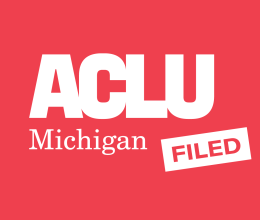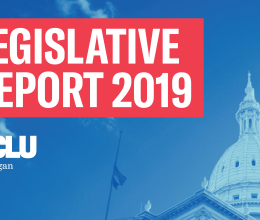MUSKEGON—Muskegon city officials announced today that they are launching legislative efforts to bring transparency to the acquisition and use of local police surveillance technologies for the first time. The measures, which are influenced by a set of guiding principles released by a diverse coalition of 17 national organizations today, include mandating city commission approval and a public hearing process that maximizes community input into surveillance technology decisions.
Kenneth Johnson, a Muskegon city commissioner, said that he and several other city officials had agreed to pursue a police surveillance bill that would publicly outline what device will be permitted; whether those technologies are in active use; and how surveillance information will be collected, used, shared and retained.
“Given growing concerns around the country about government surveillance,” said Johnson, “the City of Muskegon is pleased to work with a wide range of stakeholders to create a public and transparent process that gives residents a voice in how surveillance technology is used in our community. The Muskegon City Commission hopes this effort will strengthen police credibility and accountability without compromising public safety.”
Johnson said that he’d met with Muskegon Police Chief Jeff Lewis, City Manager Frank Peterson and fellow City Commissioner Dan Rinsema-Sybenga, and all had agreed to support the proposed ordinance. Johnson expects the ordinance to go before a city commission policy committee in October.
Rodd Monts, Field Director for the ACLU of Michigan, described the measure as “a critical first step” in a national effort to ensure greater community input into law enforcement policies, and increased accountability and transparency in police surveillance practices.
“Muskegon city leaders have approached this thoughtfully, with the best interests of both residents’ privacy and public safety in mind, and I hope other communities across Michigan follow their lead,” said Monts. “Given the proliferation of surveillance technology and growing concerns we all have about privacy rights, I do not expect this to be the only city to take this type of action.”
Meanwhile, in New York City, national ACLU leaders hailed the multi-state effort as a timely reaction to the proliferation of clandestine law monitoring by law enforcement.
“The use of surveillance by local police has been spreading unchecked across the country without regard for the communities that they purport to serve,” said Anthony D. Romero, executive director of the American Civil Liberties Union. “Today communities and their local elected officials are taking action to address the disparate impact, financial burden, and threats to civil rights and liberties posed by invasive surveillance technologies.”
In addition to Muskegon, a number of other cities announced legislative efforts today, including New York City; Milwaukee; Seattle; Washington, D.C.; Miami Beach, Fla.; Madison, Wisc.; Palo Alto, Calif.; Richmond, Va.; and Pensacola, Fla.
In the rare cases where local police data has been available to the public — in cities like Baltimore, Maryland; Oakland, California; and Lansing, Michigan — the data has shown a disproportionate use of surveillance technologies in communities of color and low-income areas. The partner organizations have created a set of guiding principles to assist community groups in changing surveillance practices. The principles aim to promote transparency, democratic decision making, and community empowerment with respect to if and how surveillance technologies are funded, acquired, and used.
The guiding principles behind this surge of legislative action, which is expected to be replicated in an increasing number of cities across the nation, are as follows:
- Surveillance technologies should not be funded, acquired, or used without express and specific city council approval.
- Local communities should play a significant and meaningful role in determining if and how surveillance technologies are funded, acquired, or used.
- The process for considering the use of surveillance technologies should be transparent and well-informed.
- The use of surveillance technologies should not be approved generally; approvals, if provided, should be for specific technologies and specific, limited uses.
- Surveillance technologies should not be funded, acquired, or used without addressing their potential impact on civil rights and civil liberties.
- Surveillance technologies should not be funded, acquired, or used without considering their financial impact.
- To verify legal compliance, surveillance technology use and deployment data should be reported publicly on an annual basis.
- City council approval should be required for all surveillance technologies and uses; there should be no “grandfathering” for technologies currently in use.
The ACLU—which in 2012 issued a report about intrusive surveillance in Lansing—worked with 16 highly diverse national partner organizations to develop the locally led, multi-city effort, among them the Bill of Rights Defense Committee/Defending Dissent Foundation; Campaign Zero; Center for Democracy & Technology; Center for Popular Democracy; Council on American–Islamic Relations (CAIR); Crypto Harlem; Demand Progress; Electronic Frontier Foundation; Fight for the Future; The Leadership Conference on Civil and Human Rights; Million Hoodies Movement for Justice; National Association for the Advancement of Colored People (NAACP); National Network of Arab American Communities; Restore the Fourth; South Asian Americans Leading Together (SAALT); Tenth Amendment Center.
Additional resources and information can be found here: www.communityCTRL.com.




